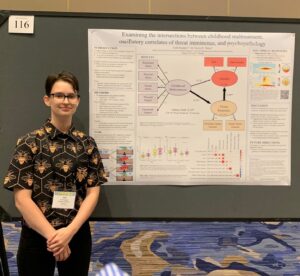
Research Interests: My main research interest is to understand how early life stress (such as childhood maltreatment) alters neural systems in adulthood, and identifying biomarkers of risk and resilience. I use multiple techniques (fMRI, EEG, GSR/EDA) to get a wholistic picture of the effects. While my current work is in healthy young adults, in the future I would like to test the utility of these biomarkers in clinical populations to improve treatment outcomes and early intervention.
Selected Work
Peer-reviewed Publications:
· Karpov, G., Lin, MH., Headley, D.B., & Baker, T.E. (in press). Oscillatory correlates of threat imminence during virtual navigation. Psychophysiology.
Conference Paper Presentations:
· Karpov, G., Lin, MH., Headley, D., & Baker, T.E. (2022, September 28-October 2). Oscillations dynamics during proximal and distal threat in a virtual room [Symposium Presentation]. Society for Psychophysiological Research (SPR) 62nd Annual Meeting, Vancouver, BC, Canada. https://onlinelibrary.wiley.com/doi/10.1111/psyp.14139
· Karpov, G., Biernacki, K., Lin, MH., Ruglass, L., & Baker, T. (2020, October 29). Improving cognitive control functioning in opioid use disorders: At the intersection of brain, trauma, and neuromodulation [Oral Presentation]. Center of Alcohol & Substance Use Studies (CAS) 7th Annual Scholar Poster Session, Rutgers University, Newark, NJ, United States.
Published Abstracts:
· Karpov, G. & Baker, T.E (2023, Sept. 27 – Oct 1). EXAMINING THE INTERSECTION BETWEEN CHILDHOOD MALTREATMENT, OSCILLATORY CORRELATES OF THREAT IMMINENCE, AND PSYCHOPATHOLOGY. Society for Psychophysiological Research (SPR) 63rd Annual Meeting, New Orleans, LA, United States. https://onlinelibrary.wiley.com/doi/10.1111/psyp.14417 link to poster
· Karpov, G., Lin, MH., Headley, D., & Baker, T. (2020, September 25-29). ELECTROPHYSIOLOGICAL EXPLORATIONS OF PASSIVE AND ACTIVE MODES IN MOTIVATED BEHAVIOR. Society for Psychophysiological Research (SPR) 60th Annual Meeting, Washington, DC, United States. https://onlinelibrary.wiley.com/doi/10.1111/psyp.13670
